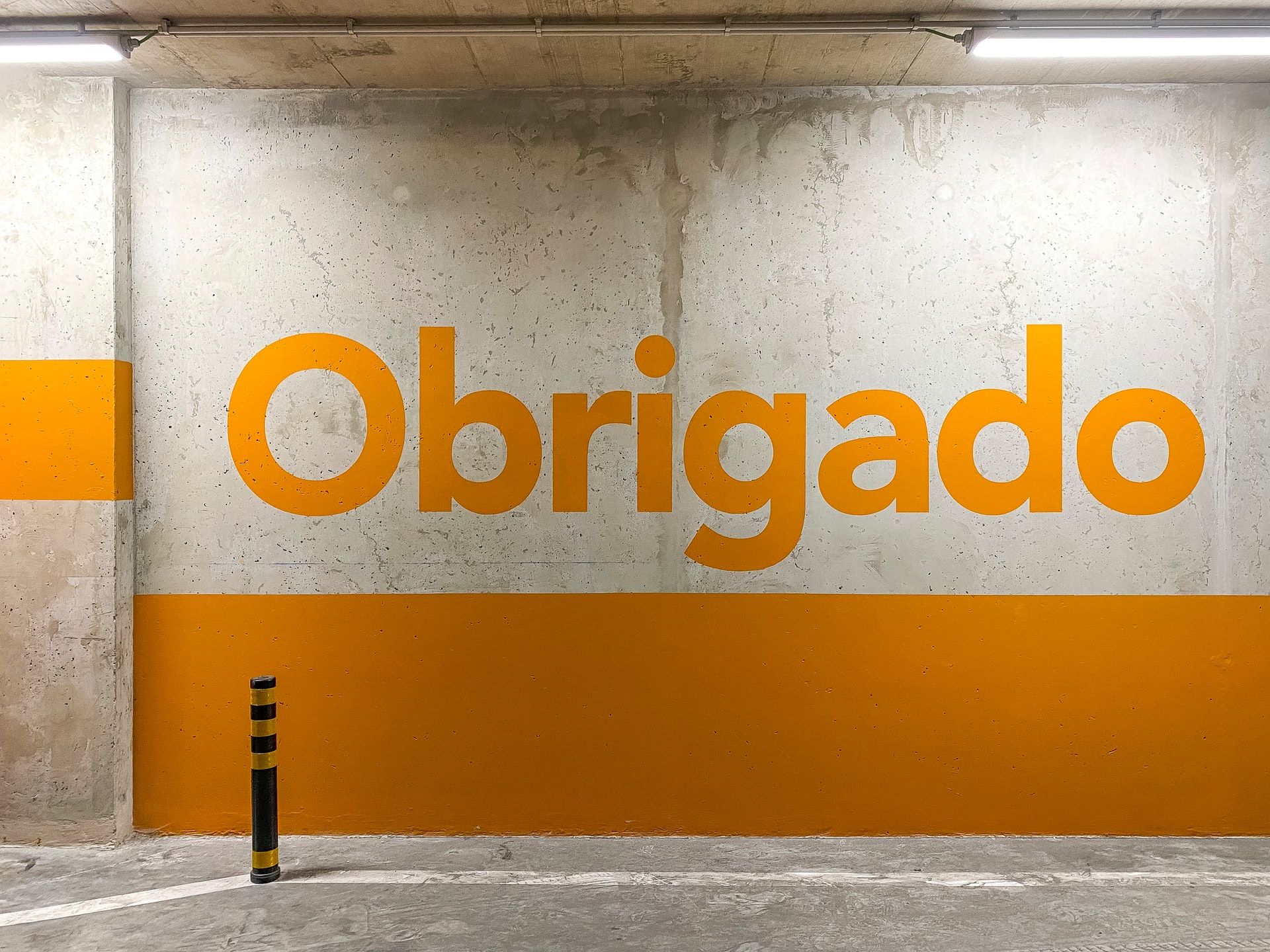Stay up to date!
Don't miss out on our upcoming Portuguese courses

Saying “thank you” is one of the most important things to learners of any language. Even if you are just travelling to another country and not seriously learning the local language, saying “thank you” in a proper way, with good pronunciation, will most likely get you big smiles and compliments. So here are 5 ways to say thank you in Brazilian Portuguese for you to practice next time you visit Brazil or get a gift from a Brazilian friend.
This is the most basic and common way to say thank you in Brazilian Portuguese – actually not only in Brazil but also in all other Portuguese-speaking countries. Women, though, have to say it in a slightly different way: Obrigada!
The reason why it changes according to the gender of the speaker, is that it litterally means “obliged” (yes, just like formal English), and in Portuguese you need to differentiate male and female in cases like this (usually with the letters “o” or “a” in the end of adjectives).
If you are REALLY thankful, you can express so by adding “muito” (much/very) to say thank you very much in Portuguese. Men will say “Muito obrigado” and women will say “Muito obrigada“. Note that we don’t change “muito” to female if it means “very”.
Feeling comfortable with the language already? How about dropping the first letter then? It’s a common way to shorten words in spoken language (although the official spelling won’t change). If you say “Brigado” or “Brigada” you will sound more like a native speaker and will surely impress people you talk to.
Now spice it up a bit and make this shortened, spoken version “Brigado” sound big. Yes, the augmentative suffix -ão is an easy way to make everything bigger in Portuguese (especially nouns and adjectives). In Brazil, “Brigadão” is the informal spoken version of “Muito obrigado“, and it’s the same for both men and women (yay!).
Now that you know all the variations of “Obrigado“, let’s get even more informal. “Valeu!” is the most common way to say thanks in Portuguese to close friends or family, while sounding younger and cooler. It means literally “it was worth it“, but it became this slang that got popular and you will probably hear it more in Brazil than other Portuguese-speaking countries.
If you want to thank someone for something they have given or done for you, you will have to use the preposition “por” (for), just like in English (Thank you for the present, thank you for flowers, thank you for coming, etc).
Now, that has a catch though. As I mentioned before, Portuguese is a very gender-oriented language, so when you say “thank you for the flowers” you will have to use the right article (male or female, singular or plural). In Portuguese the definite articles are “o” (male singular), “os” (male plural), “a” (female singular) and “as” (female plural).
But when we combine these articles with “por” we get “pelo” (por + o), “pelos” (por + os), “pela” (por + a) and “pelas” (por + as). Let’s see some examples to make it clearer.
Did you notice how we use pelo or pela according to the gender of the following word? In the examples above, presente (present) and almoço (lunch) are male nouns, whereas visita (visit), flor (flower) and ajuda (help) are female nouns. And in the case of flores, it’s female and plural, that’s why we use pelas.
How do I know which nouns are male or female? I’m glad you asked. There are some hints in the end of many words. Ending in the letters “o” or “e” is a strong indication it’s a male noun (like in presente and almoço), and ending in “a” in most cases makes it a female noun (like in visita and ajuda). But there are many exceptions, so only use this rule for when you need to guess, otherwise, it’s safer to learn case by case.
In Portuguese you can also use the adjective “grato” (or “grata“), which means grateful, but it’s usually restricted to formal situations, such as when writing a letter to someone. It can also be used to express a deeper feeling of gratitude, such as in religious contexts (eg. “Sou grato pela minha vida” = I’m grateful for my life).
However there has been a growing trend among many Portuguese speakers that prefer to say “gratidão” (gratitude) instead of “obrigado(a)”. The reason is there were discussions on social networks about how saying you are “obliged” to someone makes it feel like a duty to reciprocate the favor or gift, instead of just being grateful.
The result is many people these days will say and write “gratidão“, although it’s still somewhat a niche expression among younger people who are more connected to discussions online.
I hope this post was helpful to you! If so, let us know how thankful you are by leaving your comment below and sharing with friends who are learning Portuguese.
Gratidão! ❤️

Check out our Portuguese Basics series to learn more useful Brazilian Portuguese phrases! Also follow us on Instagram, TikTok and YouTube for more free content to learn Portuguese!